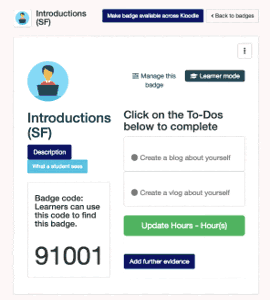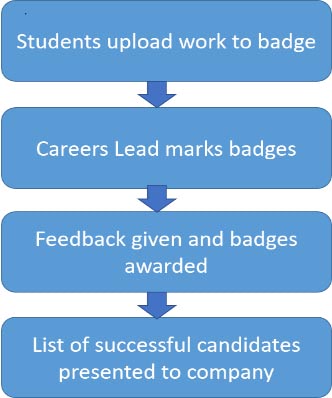Virtual Reality: Digital #Mentoring in Practice

This is the third of my articles on mentoring which followed the discussion I had during my lunch with my old friend, Andy.
In the first article, we looked at the definitions, history, theory and research.
In the second, we introduced digital mentoring and extolled its virtues.
In this follow-up article, I am going to look at how digital mentoring is successfully being carried in practice.
The Salford Foundation
The Salford Foundation is a social inclusion charity which supports the vocational, personal, social and academic development of young people and adults in Salford and Greater Manchester.
Today we’re launching our new logo and brand. We’re still doing the same great work, changing lives for the better. Now we’ve got a fresh, vibrant look to help drive our work forwards. What do you think? We’d love to know #CreatingBetterFutures pic.twitter.com/blOa9FX1xM
— Salford Foundation (@SalfordFDN) July 1, 2019
Their mission is to create the greatest range of opportunities for disadvantaged children and vulnerable adults in the area.
To help to achieve this, in 2017, the Foundation launched their ‘Inspire to Aspire’ mentoring programme, the purpose of which is to help a group of students selected from high schools in Greater Manchester to develop their ‘skills, attitude and qualities’ and nudge them to aim high and broaden their perspective, in an attempt to close the ‘aspiration-attainment gap’. These are the mentees.
The mentors are provided by an impressive array of top brand companies in the region, including:
- JD Sports
- BBC
- Cargill
- John Lewis
- BDO LLP
- McDonalds
- Premier Inn
- Lang & Rourke
- NCS
…to name a few.
Great build up to the Inspire to Aspire Salford Foundation event at BBC Quay House – Fantastic images and views! #MediaCityUK #SFInspired2019 pic.twitter.com/lmtMyi1NX9
— The FS I.T, Computing & Games Centre of Excellence (@FS_Computing) May 25, 2019
These businesses have committed to supplying volunteer employees in a range of diverse roles with a broad range of experience to act as mentors for 12 to 15 year-olds selected for the programme.
By 2018, almost 1,000 students from schools in Salford, Trafford and Bury had taken part in the project.
2019 Heralded the Advent of Digital Mentoring
Salford Foundation has continued with the programme, except there are two big changes:
- The biggest one is that the mentoring will now take place remotely, and
- The other one is that the project participants are now 16 to 19 year-olds; young people preparing for the next leap on the path into work, either directly or via the stepping stone of further education.
It’s always good to put a face to a name, so the digital mentoring kicks off with introductory physical meetings where the mentors and mentees can get to know each other, but, after that, it’s all digital.

The students respond to this because that’s how young people communicate nowadays. Mentors can run group sessions for multiple mentees but in this programme there are typically two students assigned to each employee.
The regular communication between the mentors and their assigned mentees is through the messaging system on Kloodle.
The digital approach overcomes a number of friction points; Salford Foundation and the colleges like the fact that the process saves on travel time and costs and does not impact on lesson time as the students can pick up and deal with messages when it suits them.
Typically, communication is once a week:
- For a mentor with a busy schedule, this could involve assessing submitted work for Awards at a café at the airport whilst they are waiting for a plane.
- For a student, it could be responding to a message after sports’ practice on a Wednesday evening. If it’s a busy week with lots of homework and extra-curricular activities, then it can pushed back to the weekend.
Other advantages in using a distance mentoring system is that it provides a ‘one stop shop’ so that users do not have to switch between appliances and Apps to send emails or texts, make phone calls etc.
All the information is retained on the students’ profiles and in the messaging system, so it can act as a written record with evidence of the history of the mentoring progress and is useful to help both parties get back up to speed of events before the next session and clarify any misunderstandings.
The mentoring sessions comprise of interactive activities and discussions covering some of the essential skills needed to be effective at school, in the future workplace and, most importantly, in life.
These include key attributes, such as:
- Communication
- Team-building
- Setting goals
- Presentational skills
- Problem-solving, and
- Resilience.
According to the Careers & Enterprise Company and others, employer-led activities such as this are more effective than work experience. This fits perfectly hand-in-glove with the objectives and mechanics of digital mentoring.
The next step is to maximise the effectiveness of the mentoring sessions, comprising of interactive activities to cover some of the essential skills needed to excel; the mentors set tasks for the students so that they can think about what the skills are and how to demonstrate them.
For example, one of the key skills in the programme is communication. How do you prove you have that?
JD Sports
The Salford Foundation has introduced the digital mentoring programme in tranches and the first tranche of mentors hailed from JD Sports.
Ostensibly, the brand seems to be entwined with sports gear and clothes, however, there are many different career paths available within the organisation, such as:
- Marketing
- Project Management
- Branding
- Social Media
- Photography
- Talent Acquisition
One of these careers, photography, is a major activity in the fashion industry and presents a prestigious and interesting career at JDS, with a wide range of job titles are represented in the photography department of the company.
Altogether ten photographers from the company offered their services as mentors and each one was matched to two photography students from Salford College. A 2:1 ratio has been selected initially but in time bigger mentoring groups are envisaged.
| Salford Foundation created their own bespoke es relating to activities from induction to specific tasks. |
 |
The first workshop is a face-to-face induction to the process then after that the follow up activities are carried out remotely by the mentor setting and assessing the work student’s upload to es.
Through this, students can gain exposure to a wide range of practical, work-related experiences. There are also ‘channels’ available for students to communicate with other students and mentors about threads.
The structured group programme has been developed with the guidance of businesses and schools and each of the business volunteers can personalise the programme, to include their own life and work experiences.
Full training and support is given to the mentors, both in advance of and during the programme.
Previously, there were seven sessions, but going forward with the digital programme, there will be no limit to the number of sessions and length of relationship.
A natural end would be when all of the es have been allocated, but further tasks and work could be submitted if the relationship is going well and proving fruitful.
This therefore can provide a unique and individualised programme both for the students and for the mentors, with the es scaffolding the same structure across all relationships.
Another example relating to JD Sports is that the company has a number of career paths relating to finance that they are keen to promote to students at the local Holy Cross College.
There are many skills which have been identified as critical for the role of Finance Apprentice and the three main ones are:
- Numeracy; this involves being able to manage budgets, present financial data and forecast profit, this requires the ability to work with numbers.
- Teamwork; large companies have finance departments consisting of many team members and employees need to work as part of a team to ensure the department operates successfully.
- Commercial Awareness; finance can appear abstract, but the numbers tell a story of the business. There is skill involved in being able to present the figures to tell your story.
The mentoring takes place remotely through the ing system.
The student is presented with the following message below:
Can you relate the trends to what’s happening in the shops, online or in the warehouses? |
|
In order to achieve the Finance Apprentice role, you should look to upload evidence of the above skills in your profile. You could:
Your submission will be judged by the quality of evidence you submit. HINTS: Relate your evidence to how this would help the business – “This skill would help in the world of work because……” Focus on one skill per post – this demonstrates more thought and quality. Tell a story. |
There is lots of flexibility in terms of content.
The work is submitted to the e for the Careers Lead at the employer to judge.
The Workflow for employer es is as follows:

The company then takes forward the students who have shown potential to the next stage which may involve being offered work experience or internships.
In conclusion, the projects enable sustainable partnerships to be developed between businesses and schools, whilst enabling and inspiring large groups of young people from disadvantaged backgrounds to build skills and confidence to prepare for their future place within the world of work.
The atmosphere became tense as the bill arrived.
Alumni Programme
We have extended the mentoring programme to include alumni as mentors as many schools and colleges are looking to grow their career support network in a natural and cost-effective way.
When students leave a college which has subscribed to Kloodle, they can retain their profile even though they are no longer at the college. It means that today’s students can become tomorrow’s alumni.
This way current students of a specified college will be able to interact with ex-pupils in order to hear ‘from the horse’s mouth’ about career choices and tangible aspirations.
This is a very credible and powerful medium.
The alumni are fresh, experienced and motivated mentors, who already have a connection with the mentees by having attended the same organisation; it also helps to build networks of all parties.
What Does It Mean For Andy?
I ended up paying the bill; but whilst we chatted outside the restaurant afterwards, Andy told me that he particularly liked the fact that the Awards methodology gives structure and focus to sessions, so ‘students won’t ramble’.
He was excited at the prospect of training to be a mentor and would love to help young people through a digital platform.
We put another lunch date in the diary!
Neil Wolstenholme, Chairman, Kloodle
This is the third part of a 3 part mini-series. Article 1 is about the definitions, the tradition, the history, the research and the models – it’s the framework. Articles 2 and 3 are about digital mentoring and how we do it at Kloodle, with our latest venture with Salford Foundation.
Copyright © 2019 FE News











Responses